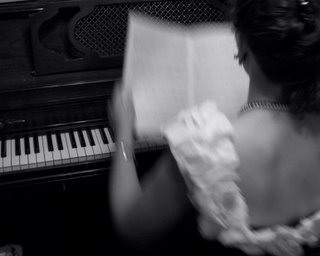
I have been relishing the challenge of this week's Carnival of Beauty topic: the Beauty of Limits. Have you noticed how often beauty arises within limits, where none was visible before? Ordinary life crowds in all around us, and we seldom notice anything spectacular, but a visionary with a camera imposes the limits of a tiny frame on reality and suddenly - beauty!
Moderns have forgotten this. We tend to think that good only rises from natural chaos. (I believe we have Darwin to thank for this nonsense. The Ancients knew better.) Our art reflects it from John Cage's experiments in musical chaos to the midden-heap of random poetry.
Moderns have particularly forgotten that limits create forms, and that forms themselves carry meaning. Deliberately formless expression can only carry a couple of meanings:
"I, as a human being, refuse to "replenish the earth and subdue it" (Gen. 1:28); or
"Look, randomness is actually impossible."
Limits actually make possible multi-layered delights; beauty within beauty. Watch. C.S. Lewis' little verse imbedded in his Pilgrim's Regress describes Hell:
God in His mercy made
The fixed pains of Hell.
That misery might be
stayed,
God in His mercy made
Eternal bounds and bade
Its waves no
further swell.
God in his mercy made
The fixed pains of Hell.
Lewis argues that Hell is like a "tourniquet on the wound through which the lost soul else would bleed to a death she never reached. It is the Landlord's last service to those who will let him do nothing better for them." And his poem is shaped like a tourniquet: the couplet "God in His mercy made/The fixed pains of Hell", binds up the poem at beginning and end. The rigid rhyme scheme and rhythm emphasise the strength of the bounds God places on misery. And, in the tradition of the ancient chaiastic poets (like David of Israel), Lewis places the most important point at the center of the poem, "God in His mercy made", framed by balancing ideas on either side like pairs of parentheses working out to the edges of the poem.
You just can't get that much meaning, that much beauty into such a small package without using limits. Limits are the antidote to ennui, as poetic forms are the antidote to grey prose. When life seems flat, an undistinguished sequence of hours and days, perhaps it is because we have too few limits.
5 comments:
the banality
of all our lumbering amusements,
the dull headache of
self awareness in the dance
of this circadian rhythm,
like the perpetual melody
of a broken music box,
day after night after day
we dream of waking,
to the aurora of a new song,
whose melody we faintly hear now,
in the laughter of children,
the honor of friendship,
the wine of communion,
and the hallowed hope
of empyreal shores.
Wonderful post, Kim! I've always admired poets who combined their best imaginative work with a tight structure. Kind of like beautiful figure-skating.
I like your metaphor of the photograph for illustrating the beauty of limits. G.K. Chesterton also had some amazing things to say about how freedom was only possible if one was "free" to bind oneself. A fascinating paradox.
Poetry is always welcome here, Mark. Thanks!
The answer to the merely circadian rhythm is not no rhythm, but more rules - musical bounds. I like it.
I do like Chesterton, Ariel!
Post a Comment